- Home
- Virginia Woolf
Genius and Ink Page 4
Genius and Ink Read online
Page 4
This we believe to be true; and yet it is oddly difficult in the case of new books to know which are the real books and what it is that they are telling us, and which are the stuffed books which will come to pieces when they have lain about for a year or two. We can see that there are many books, and we are frequently told that everyone can write nowadays. That may be true; yet we do not doubt that at the heart of this immense volubility, this flood and foam of language, this irreticence and vulgarity and triviality, there lies the heat of some great passion which only needs the accident of a brain more happily turned than the rest to issue in a shape which will last from age to age. It should be our delight to watch this turmoil, to do battle with the ideas and visions of our own time, to seize what we can use, to kill what we consider worthless, and above all to realize that we must be generous to the people who are giving shape as best they can to the ideas within them. No age of literature is so little submissive to authority as ours, so free from the dominion of the great; none seems so wayward with its gifts of reverence, or so volatile in its experiments. It may well seem, even to the attentive, that there is no trace of school or aim in the work of our poets and novelists. But the pessimist is inevitable, and he shall not persuade us that our literature is dead, or prevent us from feeling how true and vivid a beauty flashes out as the young writers draw together to form their new vision, the ancient words of the most beautiful of living languages. Whatever we may have learnt from reading the classics we need now in order to judge the work of our contemporaries, for whenever there is life in them they will be casting their net out over some unknown abyss to snare new shapes, and we must throw our imaginations after them if we are to accept with understanding the strange gifts they bring back to us.
But if we need all our knowledge of the old writers in order to follow what the new writers are attempting, it is certainly true that we come from adventuring among new books with a far keener eye for the old. It seems that we should now be able to surprise their secrets; to look deep down into their work and see the parts come together, because we have watched the making of new books, and with eyes clear of prejudice can judge more truly what it is that they are doing, and what is good and what bad. We shall find, probably, that some of the great are less vulnerable than we thought them. Indeed, they are not so accomplished or so profound as some of our own time. But if in one or two cases this seems to be true, a kind of humiliation mixed with joy overcomes us in front of others. Take Shakespeare, or Milton, or Sir Thomas Browne. Our little knowledge of how things are done does not avail us much here, but it does lend an added zest to our enjoyment. Did we ever in our youngest days feel such amazement at their achievement as that which fills us now that we have sifted myriads of words and gone along uncharted ways in search of new forms for our new sensations? New books may be more stimulating and in some ways more suggestive than the old, but they do not give us that absolute certainty of delight which breathes through us when we come again to Comus, or Lycidas, Urn Burial, or Anthony and Cleopatra. Far be it from us to hazard any theory as to the nature of art. It may be that we shall never know more about it than we know by nature, and our longer experience of it teaches us this only – that of all our pleasures those we got from the great artists are indisputably among the best; and more we may not know. But, advancing no theory, we shall find one or two qualities in such works as these which we can hardly expect to find in books made within the span of our lifetime. Age itself may have an alchemy of its own. But this is true: you can read them as often as you will without finding that they have yielded any virtue and left a meaningless husk of words; and there is a complete finality about them. No cloud of suggestions hangs about them teasing us with a multitude of irrelevant ideas. But all our faculties are summoned to the task, as in the great moments of our own experience; and some consecration descends upon us from their hands which we return to life, feeling it more keenly and understanding it more deeply than before.
George Eliot
To read George Eliot attentively is to become aware how little one knows about her. It is also to become aware of the credulity, not very creditable to one’s insight, with which, half consciously and partly maliciously, one had accepted the late Victorian version of a deluded woman who held phantom sway over subjects even more deluded than herself. At what moment and by what means her spell was broken it is difficult to ascertain. Some people attribute it to the publication of her Life. Perhaps George Meredith with his phrase about ‘the mercurial little showman’ and the ‘errant woman’ on the dais gave point and poison to the arrows of thousands incapable of aiming them so accurately but delighted to let fly. She became one of the butts for youth to laugh at, the convenient symbol of a group of serious people who were all guilty of the same idolatry and could be dismissed with the same scorn. Lord Acton had said that she was greater than Dante. Herbert Spencer exempted her novels, as if they were not novels, when he banned all fiction from the London Library. She was the pride and paragon of her sex. Moreover her private record was not more alluring than her public. Asked to describe an afternoon at the Priory, the story-teller always intimated that the memory of those serious Sunday afternoons had come to tickle his sense of humour. He had been so much alarmed by the grave lady in her low chair; he had been so anxious to say the intelligent thing. Certainly, the talk had been very serious, as a note in the fine clear hand of the great novelist bore witness. It was dated on the Monday morning, and she accused herself of having spoken without due forethought of Marivaux when she meant another; but no doubt, she said, her listener had already supplied the correction. Still, the memory of talking about Marivaux to George Eliot on a Sunday afternoon was not a romantic memory. It had faded with the passage of the years. It had not become picturesque.
Indeed, one cannot escape the conviction that the long, heavy face with its expression of serious and sullen and almost equine power has stamped itself depressingly upon the minds of people who remember George Eliot so that it looks out upon them from her pages. Mr. Gosse has lately described her as he saw her driving through London in a victoria –
a large, thick-set Sybil, dreamy and immobile, whose massive features, somewhat grim when seen in profile, were incongruously bordered by a hat, always in the height of Paris fashion, which in those days commonly included an immense ostrich feather.
Lady Ritchie, with equal skill, has left a more intimate indoor portrait.
She sat by the fire in a beautiful black satin gown, with a green shaded lamp on the table beside her, where I saw German books lying and pamphlets and ivory paper-cutters. She was very quiet and noble, with two steady little eyes and a sweet voice. As I looked I felt her to be a friend, not exactly a personal friend, but a good and benevolent impulse.
A scrap of her talk is preserved. ‘We ought to respect our influence’, she said. ‘We know by our own experience how very much others affect our lives, and we must remember that we in turn must have the same effect upon others.’ Jealously treasured, committed to memory, one can imagine recalling the scene, repeating the words, thirty years later and suddenly, for the first time, bursting into laughter.
In all these records one feels that the recorder, even when he was in the actual presence, kept his distance and kept his head, and never read the novels in later years with the light of a vivid, or puzzling, or beautiful personality dazzling in his eyes. In fiction, where so much of personality is revealed, the absence of charm is a great lack; and her critics, who have been, of course, mostly of the opposite sex, have resented, half consciously perhaps, her deficiency in a quality which is held to be supremely desirable in women. George Eliot was not charming; she was not strongly feminine; she had none of those eccentricities and inequalities of temper which give to so many artists the endearing simplicity of children. One feels that to most people, as to Lady Ritchie, she was ‘not exactly a personal friend, but a good and benevolent impulse’. But if we consider these portraits more closely we shall find that the
y are all the portraits of an elderly celebrated woman, dressed in black satin, driving in her victoria, a woman who has been through her struggle and issued from it with a profound desire to be of use to others but with no wish for intimacy save with the little circle who had known her in the days of her youth. We know very little about the days of her youth; but we do know that the culture, the philosophy, the fame, and the influence were all built upon a very humble foundation – she was the granddaughter of a carpenter.
The first volume of her life is a singularly depressing record. In it we see her raising herself with groans and struggles from the intolerable boredom of petty provincial society (her father had risen in the world and become more middle class, but less picturesque) to be the assistant editor of a highly intellectual London review, and the esteemed companion of Herbert Spencer. The stages are painful as she reveals them in the sad soliloquy in which Mr. Cross condemned her to tell the story of her life. Marked in early youth as one ‘sure to get something up very soon in the way of a clothing club’, she proceeded to raise funds for restoring a church by making a chart of ecclesiastical history; and that was followed by a loss of faith which so disturbed her father that he refused to live with her. Next came the struggle with the translation of Strauss, which, dismal and ‘soul-stupefying’ in itself, can scarcely have been made less so by the usual feminine tasks of ordering a household and nursing a dying father, and the distressing conviction, to one so dependent upon affection, that by becoming a blue-stocking she was forfeiting her brother’s respect. ‘I used to go about like an owl’, she said, ‘to the great disgust of my brother.’ ‘Poor thing’, wrote a friend who saw her toiling through Strauss with a statue of the risen Christ in front of her, ‘I do pity her sometimes with her pale sickly face and dreadful headaches, and anxiety, too, about her father.’ Yet, though we cannot read the story without a strong desire that the stages of her pilgrimage might have been made, if not more easy, at least more beautiful, there is a dogged determination in her advance upon the citadel of culture which raises it above our pity. Her development was very slow and very awkward but had the irresistible impetus behind it of a deep-seated and noble ambition. Every obstacle at length was thrust from her path. She knew everyone. She read everything. Her astonishing intellectual vitality had triumphed. Youth was over, but youth had been full of suffering. Then, at the age of thirty-five, at the height of her powers, and in the fullness of her freedom, she made the decision which was of such profound moment to her and still matters even to us, and went to Weimar alone with George Henry Lewes.
The books which followed so soon after her union testify in the fullest manner to the great liberation which had come to her with personal happiness. In themselves they provide us with a plentiful feast. Yet at the threshold of her literary career one may find in some of the circumstances of her life influences that turned her mind to the past, to the country village, to the quiet and beauty and simplicity of childish memories and away from herself and the present. We understand how it was that her first book was Scenes of Clerical Life, and not Middlemarch. Her union with Lewes had surrounded her with affection, but in view of the circumstances and of the conventions it had also isolated her. ‘I wish it to be understood’, she wrote in 1857, ‘that I should never invite anyone to come and see me who did not ask for the invitation.’ She had been ‘cut off from what is called the world’, she said later, but she did not regret it. By becoming thus marked, first by circumstances and later, inevitably, by her fame, she lost the power to move on equal terms unnoted among her kind; and the loss for a novelist was serious. Still, basking in the light and sunshine of Scenes of Clerical Life, feeling the large mature mind spreading itself with a luxurious sense of freedom in the world of her ‘remotest past’, to speak of loss seems inappropriate. Everything to such a mind was gain. All experience filtered down through layer after layer of perception and reflection enriching and nourishing. The utmost we can say, in qualifying her attitude towards fiction by what little we know of her life, is that she had taken to heart certain lessons not usually learnt early, if learnt at all, among which perhaps the most branded upon her was the melancholy virtue of tolerance; her sympathies are with the everyday lot, and play most happily in dwelling upon the homespun of ordinary joys and sorrows. She has none of that romantic intensity which is connected with a sense of one’s own individuality, unsated and unsubdued, cutting its shape sharply upon the background of the world. What were the loves and sorrows of a snuffy old clergyman, dreaming over his whisky, to the fiery egotism of Jane Eyre?
The beauty of those first books, Scenes of Clerical Life, Adam Bede, The Mill on the Floss, is very great. It is impossible to estimate the merit of the Poysers, the Dodsons, the Gilfils, the Bartons, and the rest with all their surroundings and dependencies, because they have put on flesh and blood and we move among them, now bored, now sympathetic, but always with that unquestioning acceptance of all that they say and do which we accord to the great originals only. The flood of memory and humour which she pours so spontaneously into one figure, one scene after another, until the whole fabric of ancient rural England is revived, has so much in common with a natural process that it leaves us with little consciousness that there is anything to criticize. We accept; we expand; we feel the delicious warmth and release of spirit which the great creative writers alone procure for us. As one comes back to the books after years of absence they pour out, even against our expectation, the same store of energy and heat, so that we want more than anything to idle in the warmth as in the sun beating down from the red orchard wall. If there is an element of unthinking abandonment in thus submitting to the humours of Midland farmers and their wives, that, too, is right in the circumstances. We scarcely wish to analyse what we feel to be so largely and deeply human. And when we consider how distant the world of Shepperton and Hayslope is, and how remote the minds of farmers and agricultural labourers from those of most of George Eliot’s readers, we can only attribute the ease and pleasure with which we ramble from farm house to smithy, from cottage parlour to rectory garden, to the fact that George Eliot makes us share their lives not in a spirit of condescension or of curiosity but in a spirit of sympathy. She is no satirist. The movement of her mind was too slow and cumbersome to lend itself to comedy. But she gathers in her large grasp a great bunch of the main elements of human nature and groups them loosely together with a tolerant and wholesome understanding which, as one finds upon re-reading, has not only kept her figures fresh and free but has given them an unexpected hold upon our laughter and tears. There is the famous Mrs. Poyser. It would have been easy to work her idiosyncrasies to death, and, as it is, perhaps George Eliot gets her laugh in the same place a little too often. But memory, after the book is shut, brings out, as sometimes in real life, the details and subtleties which some more salient characteristic has prevented us from noticing at the time. We recollect that her health was not good. There were occasions upon which she said nothing at all. She was patience itself with a sick child. She doted upon Totty. Thus one can muse and speculate about the greater number of George Eliot’s characters, and find, even in the least important, a roominess and margin where those qualities lurk which she has no call to bring from their obscurity.
But in the midst of all this tolerance and sympathy, there are, even in the early books, moments of greater stress. Her humour has shown itself broad enough to cover a wide range of fools and failures, mothers and children, dogs and flourishing midland fields, farmers, sagacious or fuddled over their ale, horsedealers, inn-keepers, curates, and carpenters. Over them all broods a certain romance, the only romance that George Eliot allowed herself – the romance of the past. The books are astonishingly readable and have no trace of pomposity or pretence. But to the reader who holds a large stretch of her early work in view it will become obvious that the mist of recollection gradually withdraws. It is not that her power diminishes, for, to our thinking, it is at its highest in the mature Middlemarch. But
the world of fields and farms no longer contents her. In real life she had sought her fortunes elsewhere; and though to look back into the past was calming and consoling, there are, even in the early works, traces of that troubled spirit, that exacting and questioning and baffled presence who was George Eliot herself. In Adam Bede there is a hint of her in Dinah. She shows herself far more openly and completely in Maggie in The Mill on the Floss. She is Janet in ‘Janet’s Repentance’ and Romola, and Dorothea seeking wisdom and finding one scarcely knows what in marriage with Ladislaw. Those who fall foul of George Eliot do so, we incline to think, on account of her heroines: and with good reason; for there is no doubt that they bring out the worst of her, lead her into difficult places, make her self-conscious, didactic and occasionally vulgar. Yet if you could delete the whole sisterhood you would leave a much smaller and a much inferior world, albeit a world of greater artistic perfection and far superior jollity and comfort. In accounting for her failure, in so far as it was a failure, one recollects that she never wrote a story until she was thirty-seven, and that by the time she was thirty-seven she had come to think of herself with a mixture of pain and something like resentment. For long she preferred not to think of herself at all. Then, when the first flush of creative energy was exhausted and self-confidence had come to her, she wrote more and more from the personal standpoint, but she did so without the unhesitating abandonment of the young. Her self-consciousness is always marked when her heroines say what she herself would have said. She disguised them in every possible way. She granted them beauty and wealth into the bargain; she invented, more improbably, a taste for brandy. But the disconcerting and stimulating fact remained that she was compelled by the very power of her genius to step forth in person upon the quiet bucolic scene.

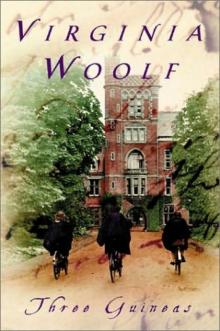 Three Guineas
Three Guineas Flush
Flush Mrs. Dalloway
Mrs. Dalloway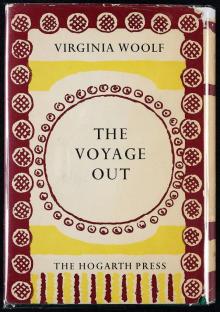 The Voyage Out
The Voyage Out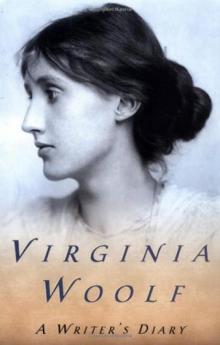 A Writer's Diary: Being Extracts From the Diary of Virginia Woolf
A Writer's Diary: Being Extracts From the Diary of Virginia Woolf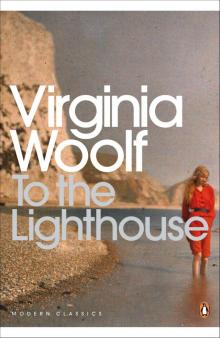 To The Lighthouse
To The Lighthouse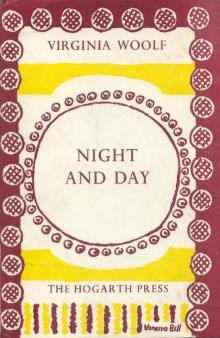 Night and Day
Night and Day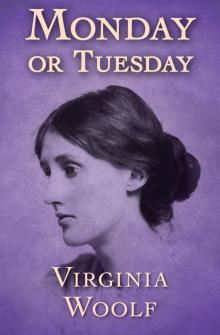 Monday or Tuesday
Monday or Tuesday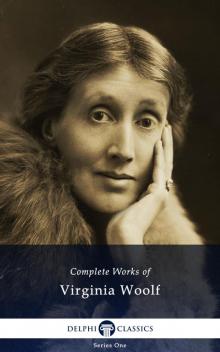 Complete Works of Virginia Woolf
Complete Works of Virginia Woolf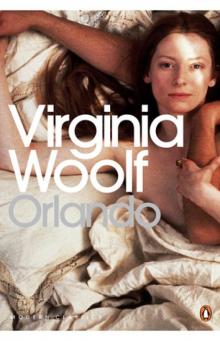 Orlando
Orlando Genius and Ink
Genius and Ink Mrs. Dalloway (Annotated)
Mrs. Dalloway (Annotated) Jacob's Room
Jacob's Room THE RUSSIAN POINT OF VIEW
THE RUSSIAN POINT OF VIEW A Writer's Diary
A Writer's Diary Woolf Short Stories
Woolf Short Stories